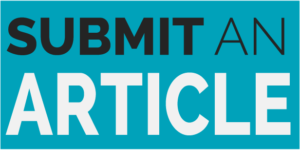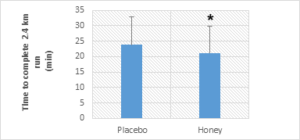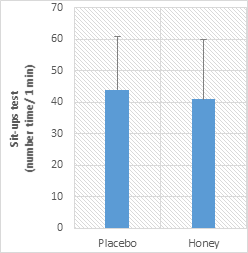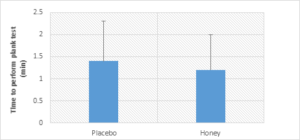Publication Information
ISSN: 2641-6816
Frequency: Continuous
Format: PDF and HTML
Versions: Online (Open Access)
Year first Published: 2018
Language: English
| Journal Menu |
| Editorial Board |
| Reviewer Board |
| Articles |
| Open Access |
| Special Issue Proposals |
| Guidelines for Authors |
| Guidelines for Editors |
| Guidelines for Reviewers |
| Membership |
| Fee and Guidelines |
 |
Effects of Honey Supplementation on Sports Performance among Recreational Runners
Chee Ping Fadzel Wong* & Dania Haziqah Binti Rahman
Nutrition Programme, Faculty of Food Science and Nutrition, Universiti Malaysia Sabah, Jalan UMS, 88400, Kota Kinabalu, Sabah.
Received Date: 02 November, 2023; Accepted Date: 17 November, 2023; Published Date: 29 November, 2023;
*Corresponding author: Dr Chee Ping Fadzel Wong, Faculty of Food Science and Nutrition, Universiti Malaysia Sabah, Jalan UMS, 88400, Kota Kinabalu, Sabah; Email: fadzel@ums.edu.my
Citation: Ping C, Wong F (2023) Effects of Honey Supplementation on Sports Performance among Recreational Runners. Adv in Nutri and Food Sci: ANAFS-253.
DOI: 10.37722/ANAFS.2023104
Abstract
This study was conducted to investigate the effects of honey supplementation on sports performance among recreational runner. Fifteen subjects (weight: 70.1 ± 10.5 kg, height: 169.7 ± 7.9 cm; body mass index (BMI): 24.3 ± 2.8 kg.m-2) participated in this randomized-crossover study. Subjects consumed honey supplementation or placebo prior the sports performance test. During the sports performance trial, subject performed fitness tests such as 2.4 km run, planks core strength, push-ups, and sit-ups tests. Time to complete 2.4 km run and plank core strength test were measured and recorded. The number times doing push-ups and sit-ups in one minute were counted. Pair-t test was used to determine the differences of the measured parameter between the two trials. This present study discovered honey supplementation trial has a significantly shorter time to complete 2.4 km run in comparison with the placebo trial (p<0.05). However, there was no significant improvement in the plank core strength, push-ups and sit-ups in the honey trial compared to the placebo trial (p>0.05). In conclusion, this present study discovered that honey supplementation has an ergogenic effects on 2.4 km run performance but did not enhance plank core strength, sit-ups and push-ups among recreational runner.
Keywords: Honey, 2.4 km run, plank core strength, sit-ups, push-ups & recreational runner.
Introduction
Nutritional ergogenic aids are substances which can enhance athletic performance by influencing physiological and psychological processes. Nutritional strategies are the common types of ergogenic aids used by sportspersons to enhance their exercise performance. Sportspersons usually take supplements before a sports competition to make sure they have adequate nutrition, maximize their energy storage, and enhance their sports performance [1]. Supplements may enhance sports performance by increasing the available glucose and free fatty acid during exercise, increasing body glycogen storage in muscle and liver, and increasing antioxidant status [2]. The increasing availability of adenosine triphosphate (ATP) in the working muscles will augment sports performance [3]. Honey is a popular ergogenic supplement commonly consumed by sportspersons to improve sports performance and health status [4-5]. Athletes will take ergogenic supplements such as honey before, during or after exercise to enhance sports performance, maximized energy storage and to accelerate recovery process [4, 6-7].
Honey is a healthy supplement which contains carbohydrates, natural enzymes, vitamins, minerals, flavonoids, polyphenols, and amino acids [8]. It was well documented that honey has antioxidant [9-13], anti-inflammatory [14-15], antimicrobial [16-17], antimutagenic [18], and antitumor [19-20] properties. To date, there was several previous studies investigated effect of honey supplementation on sports performance among athletes [6, 21-22]. Shukri et al. (2011) found that ingestion of 500 mL of honey drink one hour before trial and 3 mL.kg body weight-1 of cool honey drink every 20 minutes during the running trial was as good as a sports drink in improving running time trial performance and has similar effects on blood glucose in a hot and humid environment. Ernest et al. (2004) reported that supplementation of honey (low glycaemic index) at a dosage of 15 g every 16 km during a simulated 64-km cycling time trial was significantly faster to complete time trial in comparison with placebo trial. However, Abbey and Rankin (2009) reported that acute supplementation of honey beverage at a dosage of 1g.kg body weight-1 before and during soccer- stimulation test did not significantly improve progressive shuttle-run (PSR) test to exhaustion in comparison with the placebo trial. To date, there is still scanty information on effect of honey supplementation on sports performance in the field exercise tests such as 2.4 km running, plank core strength, sit-ups, and push-ups test. Therefore, this present study was to investigate effects of honey supplementation on sports performance in field exercise test among recreational runners.
Methodology
Fifteen recreational runners (weight: 70.1 ± 10.5 kg; height: 169.7 ± 7.9 cm; body mass index (BMI): 24.3 ± 2.8 kg.m-2) were randomly selected and participated in this randomized-crossover study. Subjects with hypertension, asthma, diabetes, bronchitis, anaemia, any injury and heart problems, kidney, or liver diseases and or any other major disease were excluded from the study. The entire experimental protocol was informed to each subject before they participated in this study. Subjects were asked to refrain from exercise for 24-hour before the tests to ensure that they have adequate rest before trial. Their food diary and physical activity diary for the last 72 hours were also collected. Subjects recorded their 3-day food diary prior to the first trial and repeated the same diet over 3 days before the days of consecutive test to minimize the differences in muscle glycogen between the trials.
Subjects required to performance two trials of sports performance tests in a randomised cross-over trial. Subjects performed sit-ups, push-ups, plank core strength and 2.4 km run with 10 minutes rest between the tests at each trial. Subjects supplemented with 40 grams of honey with 500 ml of water or placebo one-hour prior exercise trials. Time to complete 2.4 km run and plank core strength were measured and recorded. The number times doing push-ups and sit-ups in one minute were counted. There was one week wash-out period between the two trials. All the statistical analyses were computed by using the Statistical Programme for the Social Sciences (SPSS) version 29.0 (SPSS Incorp, United States). The level of significance for all analysis was set at p<0.05. All the collected data were expressed in mean and standard deviation (mean ± SD). Pair-t test was used to determine the differences of the measured parameter between the two trials.
Results and Discussion
There were fifteen recreational runners were randomly selected and participated in this study. The physical characteristic of subjects was shown in Table 1. The mean age of the subjects was 23.3 ± 3.9 (year), weight was 70.2 ± 10.5 (kg), height was 169.7 ± 8.0 (cm). Body mass index was 24.3 ± 2.8 (kg.m-2) and it was categorized as normal. All subjects were healthy and free from asthma, dry cough, diabetes, hypertension, heart disease, liver disease and cancer which fulfil the inclusion selection of subjects.
| Physical characteristics of subjects | Mean ± SD |
| Age (years) | 23.3 ± 3.9 |
| Weight (kg) | 70.2 ± 10.5 |
| Height (cm) | 169.7 ± 8.0 |
| Body mass index (kg.m-2) | 24.3 ± 2.8 |
Data are presented as mean ± SD.
The most noble finding in this present study was that the time to complete 2.4 km run test in the honey trial (21.1 ± 8.7 minutes) was significantly shorter compared to placebo trial (23.8 ± 9.1 minutes) (p<0.05) (Figure 1). This present finding was agreement with several previous studies also found honey supplementation significantly improved sports performance at pre-exercise supplementation [6, 21-23] and post exercise performance [24-25]. However, the present finding was different from the data reported study by Abbey and Rankin (2009) which reported that honey did not seem to contribute any ergogenic benefits on exercise performance. The inconsistent finding between this present study and Abbey and Rankin (2009) could be due to the different research protocol, subjects and environment condition of the research that has been conducted. Field work study has been reported to be not consistent because many parameters were not controlled such as ambient temperature and relative humidity.

Figure 1: Time to complete 2.4 km run in the placebo and honey trials. Data are presented as mean ± SD.
* Denotes significant difference from placebo trial at p<0.05.
This present study found that honey trial did not improve sit-ups, push-ups and plank core strength test significantly compared to the placebo trials (p>0.05) (Figure 2-3). It reflected that honey did not show ergogenic effects on strength exercise in comparison with endurance running exercise. It may be due to the difference in energy generating system which honey contribute more adenosine triphosphate (ATP) as energy in an aerobic running exercise compared to strength exercise.


Figure 2: Push-ups and sit-ups in the placebo and honey trials. Data are presented as mean ± SD.

Figure 3: Plank core strength in the placebo and honey trials. Data are presented as mean ± SD.
This present study discovered honey supplementation able to improve endurance running performance could be explained due to honey nutritional properties which contains glucose, amino acid and multivitamin-minerals. Several previous studies found that glucose supplementation at pre-exercise were able to enhance sports performance significantly [26-28]. Consuming monosaccharide carbohydrate such as glucose can increase oxidation rate and allow the overall intake of exogenous energy which was greater during prolonged endurance exercise [26, 29-30]. Honey contains various sources of monosaccharide carbohydrate such as glucose and fructose which acted as energy source and enhanced the endurance running performance compared to the placebo in this present study.
Conclusion
In conclusion, this present study discovered that honey supplementation at a dosage of 40 gram has an ergogenic effect on 2.4 km run performance but did not enhance plank core strength, sit-ups, and push-ups among recreational runners.
Author Contributions
DHBR—performed the research. — CPFW and DHBR analysed the data. CPFW and DHBR —wrote the manuscript. All authors contributed to editorial changes in the manuscript. All authors read and approved the final manuscript.
Acknowledgement: The authors thanks and acknowledge to all subjects participated in this research. Thanks to Universiti Malaysia Sabah for supporting this research funding.
Funding: This research was supported by a research grant (SBK0361) from Universiti Malaysia Sabah.
Conflict Interest: The authors declare no conflict of interest.
References
- Manore M, Thompson J (2000) Sports Nutrition for Health and Performance. United stated of America: Human kinetics.
- Antoni J, Stout JR (2001) Sport Supplement. Philadelphia: Lippincott Williams & Wilkins.
- Krause DW, Philips AD, Wilkie AW (2010) Sports Supplements. Lippincott Williams & Wilkins.
- Yusof A, Ahmad NS, Hamid AMS, Khong TK (2018) Effects of honey on exercise performance and health components: A systematic review. Journal of
- Science and Sport 33: 267-281.
- Hills SP, Mitchell P, Russel M (2019) Honey Supplementation and Exercise: A Systematic Review. Nutrients 11(7): 1586-1591.
- Abbey EL, Rankin JW (2009) Effect of ingesting of honey sweetened beverage on soccer performance and exercise induced cytokine response. Int J Nutr Metab 19(6): 659-672.
- Salehian O, Rashidi M, Sedaghat M (2014) Oral supplementation of natural honey and levels of inflammatory and anti-inflammatory plasma cytokines during 10-week of intensive treadmill training in endurance-trained athletes. Biomed Resources: 459-462.
- Jaya F (2017) Produk-produk Lebah Madu dan Hasil Olahannya. Indonesia: Universitas Brawijaya Press.
- Cowan MM (1999) Plant products as antimicrobial agents. Clin Microbiol Rev 12 564–582.
- Chen L, Mehta A, Berenvaum M, Zangerl AR, Engeseth J (2000) Honeys from different floral sources as inhibitors of enzymatic browning in fruit and vegetable homogenates. J Agric Food Chem 48: 4997–5000.
- Gheldof N, Wang XH, Engeseth NJ (2002) Identification and quantification of antioxidant components of honeys from various floral sources. J Agric Food Chem 50: 5870–5877.
- Al-Mamary M, Al-Meeri A, Al-Habori M (2002) Antioxidant activities and total phenolic of different types of honey. Nutr Res 22(9) 1041–1047.
- Aljadi AM, Kamaruddin MY (2004) Evaluation of the phenolic contents and antioxidant capacities of two Malaysian floral honeys. Food Chem 85: 513–518.
- Cooper RA, Molan P, Krishnamoorthy L, Harding K (2001) Manuka honey used to heal a recalcitrant surgical wound. Europ J Clinic Microbio Infect Disease 20(10): 758–759.
- Zaharil MS, Sulaiman SA, Halim AS, Jumaat MYS, Jaafar H (2011) The efficacy of Tualang honey in comparison to silver in dressing wounds in rats. J ApiProduct ApiMedic Sci 3(1): 45-53.
- Sherlock O, Dolan A, Athman R (2010) Comparison of the antimicrobial activity of Ulmo honey from Chile and Manuka honey against methicillin-resistant Staphylococcus aureus, Escherichia coli and Pseudomonas aeruginosa. BMC Comp AlterMedic 10(47): 321-328.
- Lusby PE, Coombes AL, Wilkinson JM (2005) Bactericidal activity of different honeys against pathogenic bacteria. Arch Med Res 36: 464–467.
- Wang XH, Andrae L, Engeseth NJ (2002) Antimutagenic effect of various honeys and sugars against Trp-p-1. J Agri Food Chem 50(23): 6923–6928.
- Swellam T, Miyanaga N, Onozawa M (2003) Antineoplastic activity of honey in an experimental bladder cancer implantationmodel: in vivo and in vitro Int J Urology 10(4): 213–219.
- Tomasin R, Cintra Gomes-Marcondes MC (2011) Oral administration of Aloe vera and honey reduces walker tumour growth by decreasing cell proliferation and increasing apoptosis in tumour tissue. Phytotherapy Research 25(4): 619–623.
- Shukri N, Ooi F K, Chen CK, Sirajudeen KNS (2011) Effects of acacia honey drink supplementation compared to sports drink on blood glucose and running performance in the heat. Proceding of 16th National conference on Medical and Health Sciences, Kubang Kerian, Kelantan, Malaysia.
- Earnest CP, Lancaster SL, Rasmussen CJ, Kerkisck CM, Lucia A, Greenwood MC, Almada AL, Cowan PA, Kredier RB (2004) Low Vs high glycaemic index carbohydrate gel ingestion during stimulated 64 km cycling time trial performance. J Strenght Cond Res 18(3): 466-472.
- Woolfolk KG (2012) Effect of honey on anaerobic performance in male collegiate soccer players. Electronic theses and dissertations. Georgia Southern University.
- Ahmad N, Ooi FK, Saat M, Mohamed M (2011) Beneficial effects of Acacia honey drink supplementation compared to plain water during rehydration after exercise on blood parameters and subsequent running performance in the heat. Proceedings of the 16th National Conference on Medical and Health Sciences, Kubang Kerian, Kelantan, Malaysia.
- Samsani AM, Chen CK, Ooi FK, Ismail MS (2012) Effects of Acacia honey drink supplementation compared to sports drink during rehydration after exercise onexercise metabolism and subsequent running performance in the heat. Proceedings of the 9th International Sports Science Conference. Kota Bharu, Kelantan, Malaysia.
- Jeukendrup A (2014) A step towards personalized sports nutrition: carbohydrate intake during exercise. Sports Medicine 44(1): 25-33.
- Burke LM, Hawley JA, Wong SH, Jeukendrup AE (2011) Carbohydrates for training and competition. Journal of sports sciences 29(1): S17-S27.
- Russell M, Kingsley M (2014) The efficacy of acute nutritional interventions on soccer skill performance. Sports medicine 44(7): 957-970.
- Currell K, Jeukendrup A (2008) Superior endurance performance with ingestion of multiple transportable carbohydrates. Medicine Science in Sports Exercise 40(2): 275-281.
- Triplett D, Doyle JA, Rupp JC, Benardot D (2010) An isocaloric glucose fructose beverage’s effect on simulated 100-km cycling performance compared with a glucose-only beverage. International journal of sport nutrition and exercise metabolism 20(2): 122-131.